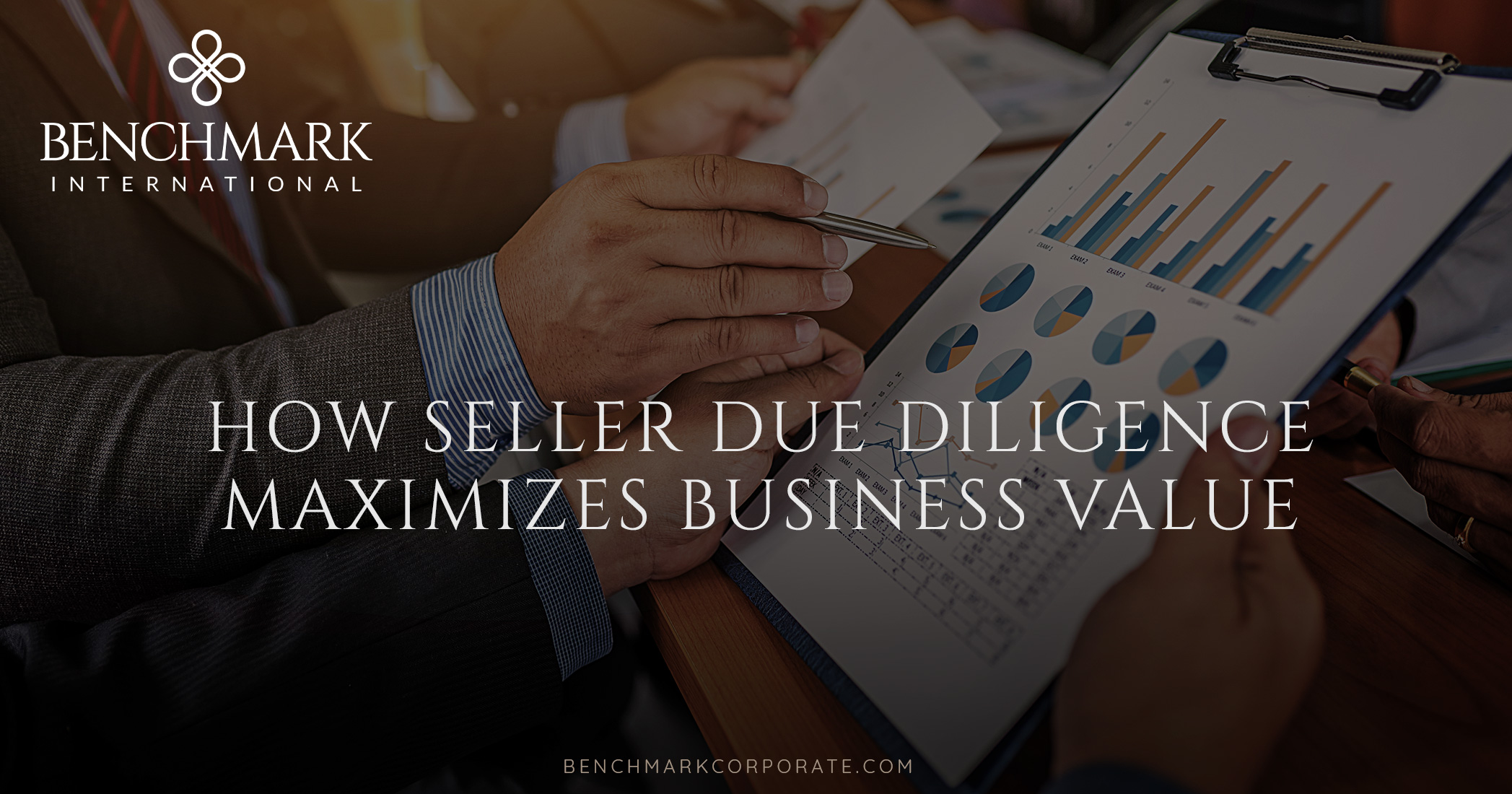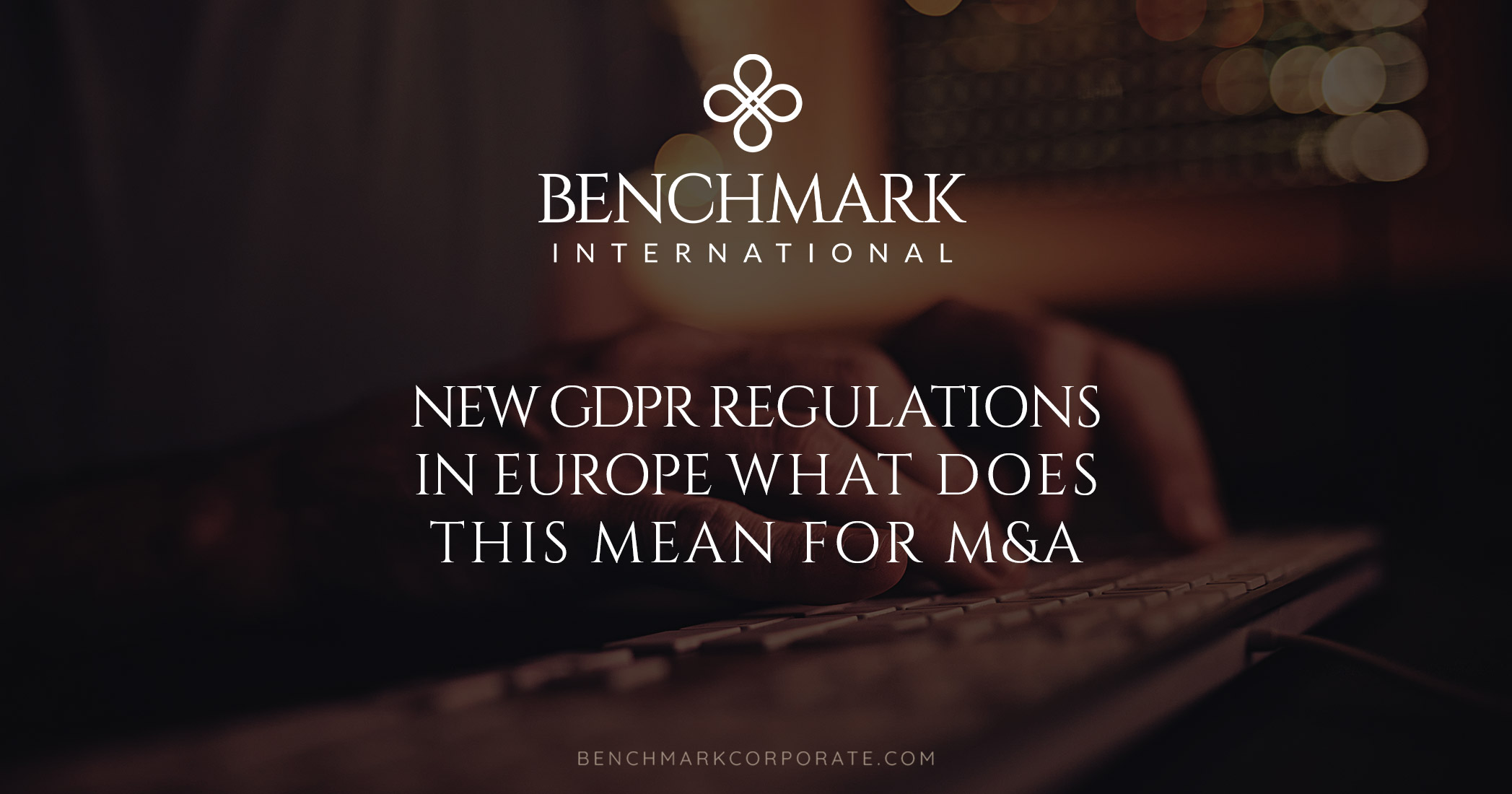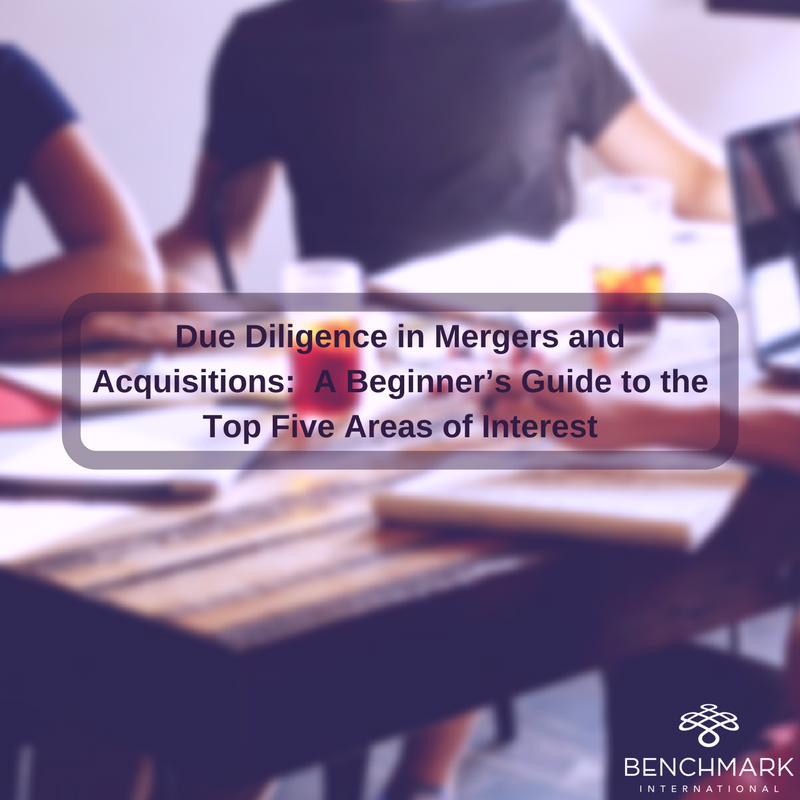The majority of sellers within the lower middle market only go through the sale process once in their lifetimes. Sellers often hire an M&A expert to help guide them through the sale process and advocate on their behalf. While M&A experts have a wealth of experience, they do not have a crystal ball.
READ MORE >>Archives
What Could Go Wrong?
Five Signs You May Need a CEO to Run Your Company
While many founders tend to be their own CEOs, sometimes you do need a little help. If you hire too soon, you waste valuable resources, but if you hire too late, you could be missing vital opportunities to grow. Choosing when to hire a CEO is a tough decision, so if you notice any of the following signs, now may be the right time to hire a small business CEO.
1. Need for More Expertise: As a business owner or founder, you started the business and transitioned it from the planning stage to successful operations. Completing this feat does not always mean that you have strong business expertise. Many times, it means that you have strong experience exclusively in your particular offering. Hiring a CEO with business experience can help your company develop new ideas, execute decisions, and formulate new strategies that will work to drive your bottom line. In some instances, people outside the company will view your business more professionally when a CEO with a background in the industry takes the reigns.
2. Not Your Passion: Even if you possess the ability to run your company, that may not be where your passions lie. If you want to focus on areas of the company, such as client relationships or product development, it may be time for you to hire a CEO. They can handle the business aspects such as operations, marketing, or production, and you can keep your focus on the interests that you enjoy and where you benefit the most for your business.
3. Clarity of Vision: If you observe that your employees seem unclear about the company's operations and goals, it is possible that they would benefit significantly from fresh leadership. A new CEO will serve as the leader for your company, make known company-wide goals, and implement your visions as the owner. This will give your company a united voice through a seasoned executive who has the experience to retain and attract a management team that will contribute to your path of long-term success. Also, a founders’ loyalty to original employees can limit potential. A CEO will evaluate performance and make tough personnel decisions for you that will drive growth.
4. Stagnation: Say you want to expand your business but find that you have to focus too heavily on keeping the company up and running. When there isn't enough time for innovation, this can lead to inactivity and cause your company to stagnate, creating severe problems down the road. A small business CEO allows you to count on them to map out growth strategies and coordinate the vital action needed to help your business scale.
Once you have decided that you are ready to find a CEO, many organizations specialize in locating and screening the perfect candidate for you. For help in your recruitment process, consider hiring an executive search firm, networking with your professional connections, creating a CEO search committee, and making sure to plan ahead. Applicant Tracking Systems such as Greenhouse, JazzHR, Breezy HR, or Google Hire can help your recruitment process. Finally, be sure to have all of the essential materials on hand to onboard your CEO candidate. Think about including your story, your primary values, and your mission to ensure vision alignment.
Share this:
Post-COVID Due Diligence
No one knows for sure how much longer the COVID-19 pandemic will be affecting our lives and our businesses. But we do know that mergers and acquisitions are still happening, deal activity will pick up, and the way we approach due diligence in a post-COVID world has the power to make major differences when it comes to selling a company. While there are new obstacles to consider, there are also significant opportunities to identify and create value, and help companies outperform the market.
Real-time Data
READ MORE >>
Share this:
The Importance of Environmental Due Diligence
We often say here at Benchmark that signing an LOI is the 10% mark of a transaction. While it’s difficult to support that quantitatively, it’s certainly anecdotally true. Due diligence is an arduous part of the closing process that will either substantiate the terms outlined in the LOI, call for different terms, or reveal such material differences that the deal craters altogether. Financial, operational, and sales diligence are all givens, but one component that isn’t always conducted is environmental due diligence. While the former three, as examples, are customary and a part of every transaction, environmental is not always a necessity. If the business is purely a service business, it is increasingly unlikely that a purchaser will seek to conduct environmental due diligence.
However, there are many reasons a purchaser may decide to conduct environmental due diligence. Perhaps, real estate is included in the deal, or maybe the target entity is a manufacturing business that uses various chemicals in the production of a product. Ultimately, the purchaser is seeking to become aware of any pre-close conditions and limit any post close liability. This is a necessary step in the process as finding and assessing potential issues affecting the facilities is imperative to the facility’s overall health and safety for its future employees and customers. The environmental due diligence audit ensures future regulatory compliance and reduces potential issues as well as future energy and waste costs associated with the property.
Traditionally, purchasers have sought to go straight to a Phase 1 ESA (Environmental Site Assessment) which we will discuss further below in this article. However, environmental due diligence can be very costly and time intensive. Many environmental consulting firms now offer an Environmental Desktop Report. This is the most cost-effective tool for evaluating the risk of future property, as it is done without a visit from the environmental consultant on-site to the property. This assessment is limited and is used as an initial screen of the property to understand the potential environmental liabilities better. Different types of environmental desktop reports consist of Historical Records and Database Review, Records Search with Risk Assessment, Environmental Historical Reports, and Environmental Database Reviews. If any documented contamination has been identified from the past and the purchaser feels more comfortable with further inspection of the property’s existing state, the process expands to the previously referenced on-site Phase I ESA. Many times, the Desktop Report is packaged with the Phase I process to streamline. The Phase I ESA includes a site visit by the Environmental Professional to document the potentially hazardous materials that could exist. Phase I ESA uses historical resources such as local, state, and federal records to identify any past uses and occupants of the property. Additionally, the purchasing party will conduct interviews with tenants, government officials, as well as nearby businesses. Once all research is complete, the group will prepare a records review to determine if the next steps may be applicable.
If contamination is detected, the viable next step is a Phase II ESA. Phase II ESA is essentially a field investigation that evaluates the impact the hazardous waste had on the property. Phase II ESA includes Soil Sampling, Groundwater/Surface Water Sampling, Geophysical Testing for Tanks, Drums & Waste Materials, among other tests. The most frequent substances tested are petroleum hydrocarbons, heavy metals, pesticides, solvents, mold, and asbestos. After proper testing and concise reporting, a Phase III ESA may be completed to remediate any contamination based on recommendations made during Phase II. Phase III ESA includes identifying the extent of contamination, determining the amount of material that was impacted by said contaminants, and assessing options available for all parties involved.
Regardless of the findings, it is very rare that a buyer walks away after conducting and concluding environmental due diligence. If it makes it past the Phase II ESA, evidently there will be some remediation. In the very off chance that the contamination is beyond safe and capable remediation, Phase IV ESA will be conducted. Phase IV ESA is quarantine and closure of the site. Think of Chernobyl. It’s not an often occurrence, and one we haven’t seen here at Benchmark. All in all, it’s helpful to understand this part of diligence, its importance, and level of detail associated with it. Buyers and sellers alike should be as informed as possible, heading into the due diligence.
READ MORE >>Share this:
How Seller Due Diligence Maximizes Business Value
Selling a company is a momentous life event for any business owner. You have worked hard to build it and want to achieve the highest acquisition value possible when you are ready to sell. To do this, you should be fully prepared for any prospective buyer to conduct rigorous due diligence, which means you should be prepared to do your own.
What is due diligence? A comprehensive appraisal of your business to establish its assets and liabilities and evaluate its commercial potential.
If you carry out thorough due diligence before putting your company on the market, it will be primed and ready for the buyer to conduct their due diligence process. By being sufficiently prepared, your business is going to appear more attractive to buyers.
Planning Ahead is Crucial
First things first: plan ahead and plan early. Give yourself enough time to optimize the company’s value before putting it on the market. A carefully planned sales strategy is sure to garner better value than what appears to be a hasty fire sale. It is best to wait to sell until you have done everything that you can to maximize your company valuation. When you take the time to position your business attractively for the marketplace, it reduces the odds of a negative outcome.
Start by identifying the key value drivers for your business and how they can be improved. This will help you find obstacles to a sale before a buyer does, and give you time to address any issues. These drivers include:
• Skilled, motivated workforce
• Talented management team
• Strong financials and profitability
• Access to capital
• Loyal and growing customer base
• Economy of scale
• Favorable market share
• Strong products/services and mix of offerings
• Solid vendor relationships and supplier options
• Sound marketing strategy
• Product differentiation and innovation
• Up-to-date technology and workflow systems
• Strong company culture
• Research and development
• Protected intellectual property
• Long-term vision
It is common for buyers to be especially concerned with company culture and existing customer relationships. Make sure your employees and your customers know what to expect and share your vision. If there is misalignment in these areas, it can unfavorably impact the post-sale performance of the company.
Having all your documentation in order, ensuring its accuracy, and putting it all on the table is going to make you a more trusted seller and increase the value of the business. It will also help you avoid constant back-and-forth requests from a buyer, which can be a distraction for you while you’re trying to run a business.
Creating a secure and efficient virtual data room (VDR) for storage and review of documents offers major advantages. A VDR is a secure online document repository that enables efficient collaboration between parties in any location so they may share information at any time during the pre-deal phase. A VDR also makes it easier to compile and verify every document internally and avoid duplicating efforts. Plus, it offers exceptional security to safeguard against confidential information ending up in the wrong hands. Once you have your VDR completed and vetted internally, you can open the files up to outside partners. Overall, the VDR is your secret weapon in making sure all of your documentation is centralized and that you are presenting your company in the very best light.
You can learn more about the documentation you will need to compile here.
Timing is Everything
You want to sell at the right time based on the market, which is always changing. Being adequately prepared to sell means being ready to act when the time is right. And selling at the right time means getting more value for your business.
Something else you must consider is if you are truly ready to sell. This is not the time to be emotional. Once you’ve initiated the sales process, the last thing you want to do is change your mind when buyers are already involved in the conversation. This will give you a reputation of being disingenuous and not being a serious seller, scaring off potential buyers in the future and devaluing your company.
Professional Help is Key
If it sounds like preparing for the sale of your company is an exhaustive undertaking, that’s because it is. But you do not have to do it alone. If you enlist the expertise of a reputable mergers and acquisitions firm, they can lead the way and help you get the most value for your company. A good M&A Advisor will know better than anyone how to steer you through the due diligence process.
They will also know when the market is in the right place for a sale, and give you access to quality buyers that you can trust. It is also important to note that buyers are going to take you much more seriously when you have partnered with a highly regarded M&A firm.
At Benchmark International, we’re here for you. Our experts are ready to partner with you to exceed your expectations and make great things happen.
Share this:
Five Changes to Due Diligence to Expect in the Next Five Years
Due diligence, the start of the end whereby a business is scrutinised by a prospective buyer to establish its assets and liabilities and evaluate its commercial potential before purchase. Unfortunately, it is very time intensive and can make or break an M&A deal.
Thankfully, due diligence has evolved and improved, largely due to advances in technology and digitisation, helping those undertaking due diligence avoid physical data rooms and huge volumes of paper documents, instead using sophisticated, intelligent virtual data rooms, complete with digital content libraries and access to automated analytic reporting.
This has led to greater speed, simplicity and security across the entire process, enabling practitioners to close deals faster.
However, it is still a frustrating process, so is it possible that due diligence could become more efficient than it has in the past? Could technology transform due diligence? And what other factors could impact the process in the next five years?
READ MORE >>Share this:
The Benefits of Data Rooms (VDRs)
The due diligence process for an M&A transaction can be very cumbersome for all parties involved. The usage of a data room is one of the most valuable ways to mitigate the headaches that arise from the motions of due diligence. There are generally two types of data rooms: physical and virtual. The former is not the most practical in most larger scale transactions with moving parts in varying geographies. Thus, you will almost always see the usage of a virtual data room (VDR) in an M&A transaction. These VDRs provide organization and security for sellers, buyers, and advisors.
Organization is probably the most easily identifiable benefit that VDRs provide. They provide a repository for all documents pertaining to the transaction. From a Phase 1 Environmental Site Assessment to the 2016 YE Income Statement to the buyer’s first draft of an Asset Purchase Agreement, it will reside in the data room. VDRs essentially eliminate the need to transmit documents through e-mail. When there are 10+ individuals across parties needing to review documents, e-mail transmission is not practical in terms of time or organization. Relying on e-mail may result in an organizational catastrophe, and many documents may quite simply be too large for e-mail transmission. Though it may be difficult to quantify in dollars, VDRs are undoubtedly a cost saver, particularly for sellers. Many intermediaries such as Benchmark International use and administrate VDRs for their sellers at no additional cost, whereas many transaction advisors focusing on the legal or financial aspects of a deal are likely to charge additional fees for the usage and administration of a VDR.
Security is a highly underrated and less thought of benefit to using a VDR. E-mail isn’t the best vehicle to transmit sensitive employee information, tax data, or any other sensitive diligence documents. While we all will use e-mail frequently to communicate over the course of diligence, it should be a last resort for the transmission of sensitive data. One e-mail in the wrong hands could easily derail not just the transaction, but the going concern of the business. Professional VDRs are also more secure than free or low-cost cloud hosted repositories such as Dropbox, Google Drive, and OneDrive. These repositories are excellent for personal use or small B2B transmissions, but they don’t provide anywhere close to the same level of security as a VDR. VDR data centers provide physical security (people and cameras), backup servers and generators, and top of the line digital security by way of multi-layered firewalls and 256-bit encryption. Another security benefit of a VDR is the ability to layer. Layers or levels allow administrators to dictate which individuals or parties have visibility to certain documents. It’s quite possible that certain information will not be accessible until diligence milestones are met. Layering the data room helps provide accountability, but most importantly: security.
There are countless other benefits, but these are some of the most crucial that impact all parties involved in an M&A transaction. Benchmark International, through its vendor, provides a tailored VDR experience and service to all of its clients to help facilitate seamless due diligence processes and successful deal closings.
Author:
Billy Van Buren
Senior Associate
Benchmark International
T: +1 (512) 861 3312
E: VanBuren@benchmarkcorporate.com
Share this:
What is included in the M&A due diligence?
The due diligence process is one of the final steps in an M&A transaction where the potential buyer does its obligation to best confirm and verify the seller's company data and relevant information. This information typically includes but not limited to: financials, IT, operations, legal & compliance, insurance, corporate bylaws, contracts, customers, among other important information. Typically, the due diligence process follows the execution of a letter of intent (LOI), a non-binding document outlining the intent of both parties to commit to the transaction.
Once the LOI has been executed, the buyer will request a list of items to be shared by the seller with the intention of disclosing the selling company’s key details that could uncover risk buyer. As mentioned before, items can range all the way from financials to operations to insurance to contracts, among others. In cases where the seller owns the real estate, additional documents pertaining to the real estate, such as: deeds, mortgages, tax documents, owners’ insurance, etc. will need to be provided. Given today’s advancements in technology, once the due diligence request list has been sent to the seller, the team leading the deal will proceed to open what we call in the M&A world a “virtual data room” or a “data room.” These two terms are referred to as online portals that hold and store the information requested by the buyer with high levels of security only available for certain parties, including: buyer, seller, M&A attorneys, CPAs, advisors, among others. The data room allows activity within the room to be tracked and archived so there is a file of the information exchange after closing should any issues arise.
Once the due diligence starts, it is highly recommended for the buyer to hold, at the very least, weekly meetings or calls with the seller to discuss outstanding items or any questions that may have arisen from the process. As the due diligence process progresses, the buyer will become more familiar with the seller’s company. For an instance, should the buyer find any items that may play against the seller in the due diligence process, the buyer may use this to lower the valuation of the business which may ultimately result in a lower offer price.
In addition, this process can result as a discovery of potential opportunity to better structure the deal, find real synergies among parties, review any benefits and challenges for potential system integrations, and any associated risks that may arise from the result of this potential acquisition.
READ MORE >>Share this:
Top Tips to be Due Diligence Ready
It is imperative that during an M&A transaction thorough due diligence is conducted, not least because it helps to establish the true value of a transaction.
Due diligence is a term applied to the work acquirers undertake after signing HoTs (Heads of Terms) and falls into three main categories: commercial due diligence, financial due diligence and legal due diligence. It is a review of the seller’s company and includes looking into areas such as potential risks and liabilities, the seller’s competition, middle management and employees, financial status, intellectual property, and assets.
It is not an easy task to conduct, so here are five tips on how to ease the process:
TIP ONE: IT’S NEVER TOO EARLY TO PREPARE
An acquirer will want to see an extensive list of documentation which can include copies of contracts with suppliers, intellectual property registration, computer systems and data protection, employment contracts and pensions, and much more.
It is wise to draw up a due diligence checklist anticipating what an acquirer will want to know – most will provide this when the time comes but a checklist early on ensures that these documents are prepared and up-to-date.
Being prepared with this information, before an exit is even on the cards, is important as it can help expedite the transaction and make the company look more attractive to potential acquirers – if information can be provided quickly, an acquirer will know the transaction is being taken seriously.
TIP TWO: USE A DATA ROOM
Share this:
New GDPR Regulations in Europe: What Does This Mean for M&A?
On the 25th May 2018, a new data protection regulation (the General Data Protection Regulation or GDPR) replaces the Data Protection Directive with the aim of protecting the personal data and privacy of EU citizens. It must be adhered to by all companies conducting business in the EU, regardless of the location in which they operate.
So, in the context of M&A activity, how will this affect you? One of the changes places a heavier emphasis on the privacy of a company’s customers; therefore, companies will be scrutinised on how they collect, store, use and transfer personal data. The knock-on effect this then has is that during a transaction, an acquirer will carry out even more comprehensive checks on the target, examining internal data protection systems and processes and undertaking checks on contracts with suppliers and subcontractors, which must comply with the new regulation.
This is in an acquirer’s best interest, as they inherit any existing data protection liabilities from the seller post-sale and the penalties for a breach are steep, attracting a maximum fine of either €20m, or 4% of global turnover, depending on whichever figure is highest.
It also will have an effect on the communicating of personal data during the due diligence process between an acquirer and seller. Personal data can now only be disclosed if the acquirer can show a legitimate interest. While in the M&A process, an acquirer can prove that they do have a legitimate interest in the data this is unlikely to extend to every individual involved in the business, instead just encompassing members of the organisation such a managers. Care then has to still be taken to not personally identify any individual outside of this remit, so a seller must make sure they are cautious not to identify individual customers or employees and suitably anonymise this data.
READ MORE >>Share this:
Due Diligence in Mergers and Acquisitions: A Beginner’s Guide to the Top Five Areas of Interest
Due diligence by potential buyers takes up a serious amount of time in any M&A process. Essentially, it’s designed to make sure the buyer knows exactly what it is that they’re buying – and in other cases, ‘reverse diligence’ helps the target company understand whether a potential buyer or merger partner is right for them.
READ MORE >>Share this:
The Art of Due Diligence - Part 3
The Art of Due Diligence - Part 2
The biggest fear for any buyer in an M&A transaction is purchasing a problem rather than a solution.
READ MORE >>Share this:
The Art of Due Diligence - Part 1
This is the first of three blogs that will give you, the business owner looking to sell your company, an insight into the art of due diligence and its important in the M&A process.
READ MORE >>Share this:
The importance of good HR practice in completing a sale
Due diligence often throws up a broad range of issues that can threaten to scupper a deal. One of the biggest culprits, surprisingly, is an issue most business owners possibly wouldn’t consider to be a factor in this situation: HR.
READ MORE >>Share this:
Preparing a business for sale
Whether a decision has been made to sell a business or not it is always beneficial to consider how a prospective buyer would perceive your business. Viewing the intricacies of your business from an outside perspective is typically the best way to identify areas within your business that could possibly reduce overall value upon an eventual exit.
READ MORE >> Benchmark International
Benchmark International  Benchmark International
Benchmark International 












